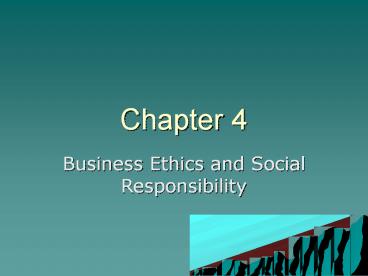Business Ethics and Social Responsibility PowerPoint PPT Presentation
Title: Business Ethics and Social Responsibility
1
Chapter 4
- Business Ethics and Social Responsibility
2
4.1 Business Ethics
- A neighbor offered you 15 for picking up her
mail. Afterward, she gives you 20 and refuses
to take change. She actually gave you two
twenties that were stuck together. What would
you do??? Be honest. - What would you do if you found a copy of a
midterm exam or a diamond ring in the restroom at
a restaurant?
3
The Nature of Ethics
- ETHICS- moral principles by which people conduct
themselves personally, socially, or
professionally. - BUSINESS ETHICS- rules based on moral principles
about how businesses and employees out to conduct
themselves. - Unethical behavior by customers result in
businesses having to raise prices for products. - CODE OF ETHICS- set of guidelines for maintaining
ethics in the workplace.
4
Laws and Ethics
- OSHA (Occupational Safety and Health
Administration) part of the US Department of
Labor. They set and enforce rules for
work-related health and safety.
5
Ethics and Good Business
- A code of ethics can cover issues such as
employee behavior and environmental safety. - Unethical business practices include, lying,
offering merchandise known to be substandard, or
treating customers or employees unfairly. - Owner could be fined or spend time in jail.
- Employees might be fired or lose his or her
license.
6
Sample
- Suppose you own an auto-body paint shop. To
increase your profits, you charge tope price and
use the cheapest paint. One of your customers
complains about the quality of paint, but you do
not care because she has already paid. What is
one customer, right? The is that most businesses
(especially small businesses) rely on repeat
customers. The amount you make in profits from
one unhappy customer may not be worth the lost
business. Or would it?
7
Sample
- Suppose you manage a small film distribution
company. You hire Jaime fresh out of business
school to run the office. You teach him how to
use the computer system, how to deal with
customers, and how the business works. You also
pay him very little, make him do all your work,
and treat him poorly. The first chance Jaime
gets, he quits and ends up being hired by one of
your competitors. You now have to retrain a new
employee to take his place. Meanwhile, your
competition no has a well trained employee, who
is much more efficient.
8
Conflicts of Interest
- Conflict between self interest and professional
obligation. - Ex A manager of a small business hires his
sister to do some work in the firm, but she is
clearly unqualified to do the work. Giving the
position to the sister will help out the family
but will create morale problems with the other
employees. It may also damage the business if
her work does not get done. When making business
decisions, employees have an ethical obligation
to act in the best interest of the company.
9
Ethical Questions
- Is it against the law? Does it violate company
or professional policies? - Even if everyone is doing it, how would I feel if
someone does this to me? - Am I sacrificing long-term benefits for
short-term gains?
10
ETHICAL Decision Making Process
- 1. Identify the ethical dilemma.
- 2. Discover alternative actions.
- 3. Decide who might be affected.
- 4. List the probable effects of the
alternatives. - 5. Select the best alternative.
11
4.2 Social Responsibility
- Social Responsibility is the duty to do what is
best for the good of society. - Businesses that follow ethical standards value
integrity and honesty in employees. - Ethics are an integral part of their business
practices. - Some people believe that if a company produces
goods that benefit society, it is fulfilling its
social responsibility.
12
Responsibility to Customers
- Customers are a businesss first responsibility.
They should offer a good, and safe product or
service at a reasonable price. - FDA (Food and Drug Administration) protects
consumers from dangerous or falsely advertised
products. - Fair competition between businesses is necessary
for the marketplace to operate effectively. - When companies restrict competition, consumers
are affected. They have fewer choices. - When a company does not have to compete, its
productivity decreases.
13
Responsibility to Employees
- Some businesses provide work experience for
people with limited job skills. - Volunteerism is another way businesses tackle
societal problems. - Workers used to have few rights.
- New laws
- Equal Pay Act (1964)-men and women paid the same
for doing the same job. - Americans with Disabilities Act
14
Responsibility to Society
- One of the biggest social issues facing
businesses today is ENVIRONMENTAL responsibility. - 1970, Environmental Protection Agency (EPA)
enforces rules that protect the environment and
control pollution.
15
Responsibility to Creditors and Owners
- 1990s into the 21st century, a number of
corporations kept inaccurate accounting records.
Because of this, the federal government passed
additional legislation. The Sarbanes-Oxley Act
mandates truthful reporting and makes the CEO
more accountable for the actions of the financial
managers of the firm.

